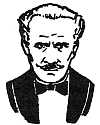|
A Radio Talk by Charles F. Kettering The date was November 16, 1908, just 35 years ago; the place, the Metropolitan Opera House; the Opera, Aida; and the conductor, as you may have guessed, was Arturo Toscanini. It was his American debut.  The Metropolitan was filled to capacity. Over 3,500
people, listening and observing the Maestro's masterly direction, just
as you are doing in Radio City this afternoon. When we hear these
concerts in this auditorium, we have the advantage of being in the
presence of the orchestra and feeling the inspiration of the conductor.
The Metropolitan was filled to capacity. Over 3,500
people, listening and observing the Maestro's masterly direction, just
as you are doing in Radio City this afternoon. When we hear these
concerts in this auditorium, we have the advantage of being in the
presence of the orchestra and feeling the inspiration of the conductor.
Today, in contrast to 35 years ago, there is an additional audience of nearly six million radio listeners. I like to think of each person in the studio audience as personally representing about 5,000 of these radio listeners.  This modern opera house of the air has seats in every part of the world
- from a snow-banked hut in Alaska to a military post in the Panama
Canal Zone; from a cabin in Maine to a house in Hawaii! In South
America, they are listening to this program at dinner; in
Hawaii, they are getting ready for luncheon. At least 100,000 people
are listening in automobiles; and ship at sea are part of the great
concert hall.
This modern opera house of the air has seats in every part of the world
- from a snow-banked hut in Alaska to a military post in the Panama
Canal Zone; from a cabin in Maine to a house in Hawaii! In South
America, they are listening to this program at dinner; in
Hawaii, they are getting ready for luncheon. At least 100,000 people
are listening in automobiles; and ship at sea are part of the great
concert hall. |








